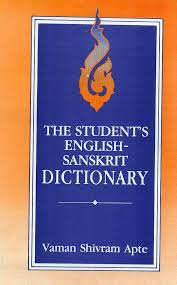The Student's English-Sanskrit Dictionary
The present Dictionary is a practical exercise in word-compilation to facilitate the study of Sanskrit language. Based on Webster's complete English dictionary it includes general terms of all sciences and such technical terms as could be duly represented by Sanskrit equivalents actually existing in that language. In giving euivalents in this dictionary, whether for Substantives, Adjectives, Adverbs or Verbs, the author has endeavoured to strike a middle course and has kept one principle steadily in view to give such words as are found frequently used in the works of standard authors. The equivalents are arranged in the order of their frequency of use; and the student, in his ordinary prose composition, would do well to make his selection from the first few equivalents enumerated. It is only in a few cases of substantives that the author has gone the length of giving all words enumerated in the Amarkosha and in the case of names of material sutances, names of plants and trees that have been identified, and in a few others, all the words given in Amarkosha have been incorporated. The dictionary will be useful not only to those for whose use it is principally prepared, but to the general public also who may wish to avail themselves of appliances calculated to help the study of Sanskrit. It will be useful to all readers of Sanskrit for translating only passages dealing with ordinary subjects.
| Vender | Rasbihari Lal & sons |
The present Dictionary is a practical exercise in word-compilation to facilitate the study of Sanskrit language. Based on Webster's complete English dictionary it includes general terms of all sciences and such technical terms as could be duly represented by Sanskrit equivalents actually existing in that language. In giving euivalents in this dictionary, whether for Substantives, Adjectives, Adverbs or Verbs, the author has endeavoured to strike a middle course and has kept one principle steadily in view to give such words as are found frequently used in the works of standard authors. The equivalents are arranged in the order of their frequency of use; and the student, in his ordinary prose composition, would do well to make his selection from the first few equivalents enumerated. It is only in a few cases of substantives that the author has gone the length of giving all words enumerated in the Amarkosha and in the case of names of material sutances, names of plants and trees that have been identified, and in a few others, all the words given in Amarkosha have been incorporated. The dictionary will be useful not only to those for whose use it is principally prepared, but to the general public also who may wish to avail themselves of appliances calculated to help the study of Sanskrit. It will be useful to all readers of Sanskrit for translating only passages dealing with ordinary subjects.


